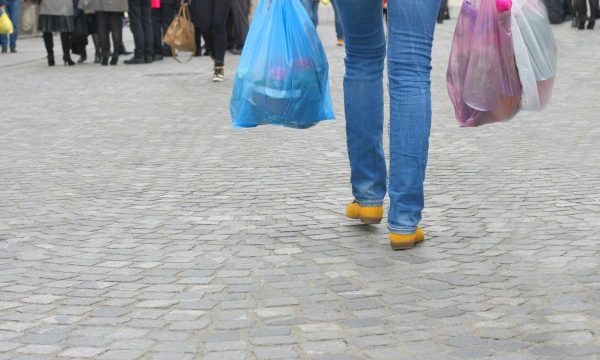Nanny of the Week: California bans plastic bags

By Eric Boehm | Watchdog.org
California became the first state in the nation to enact a statewide ban on plastic shopping bags this week, taking a concept that had been limited to nanny cities and broadening it in brand new ways.
“This bill is a step in the right direction — it reduces the torrent of plastic polluting our beaches, parks and even the vast ocean itself,” said Gov. Jerry Brown, according to U-T San Diego.
IN THE BAG: Plastic bags are now illegal in California, but the feel-good environmental policy doesn’t actually do much to fix the problems it claims to address.
Except no.
Plastic bag bans might make environmental-types feel good, but beneath the shiny veneer of seeming like a good idea, they’re actually a combination of ineffective and inconsequential.
They don’t make people stop using plastic bags, they don’t reduce litter and they don’t help the environment. They just make you carry all your groceries in other types of bags.
Let’s start with those other types of bags. If you live in California, you’ll probably want to invest in some canvas sacks for the purpose of carrying groceries — these reusable bags reduce waste, the pro-bag-ban crowd wants you to believe.
But they also get pretty dirty after you use them a few times.
“Coercing people to use cloth shopping bags will subject people to unnecessary health risks caused by festering bacteria from prior food purchases contaminating newly bought food,” said James Taylor, senior fellow for environmental policy at the Heartland Institute, an Illinois-based free market think tank.
To avoid contamination and sickness, you should wash your reusable shopping bags after every use.
Aside from the inconvenience, that means using up more water. That’s not really a major problem, unless you happen to live in a state experiencing the worst drought in its recorded history, which California currently is.
The drought is so bad that toilets and taps are running dry, according to the New York Times, but apparently residents are expected to use what little water they have to clean their reusable grocery bags.
What about paper bags? Well, they do break down faster in dumps than plastic bags, and they don’t have to be washed and reused.
They also require 70 percent more energy to produce and cost three times as much to produce, not to mention the fact they can litter city streets just as easily.
After San Francisco became one of the first cities in the country to ban plastic bags in 2007, the city’s own audit department determined the new policy didn’t cut down on litter.
Now unable to get plastic bags at check-out lines, it seems many San Franciscans turned to buying plastic bags instead.
As Patrick Gleason of Americans for Tax Reform pointed out in a 2011 National Review article about the San Francisco plastic bag ban: “I don’t know about you, but bags from the store I usually keep to reuse again, to line waste bins, clean up after a pet, etc., so when you don’t have a stockpile built up and aren’t saving these bags, you have to go buy new ones. This goes together with the nonsensical nature of this policy, which has no positive impact on the environment. What’s the point of discriminating against bags on one side of the checkout from bags on the other?”
Don’t let the facts get in the way of a feel-good environmental story.
“We’re the first to ban these bags, but we won’t be the last,” Brown predicted as he signed the bill into law this week.
He may be right. Nannyism does tend to spread, as we’ve already seen with city-level plastic bag bans.
But for being the first to boldly go where no nanny state has gone before, California is this week’s winner. The state’s prize is contaminated food and a not-better-off environment.
Boehm can be reached at EBoehm@Watchdog.org and follow @EricBoehm87 on Twitter for more.







